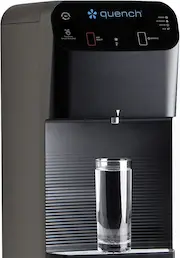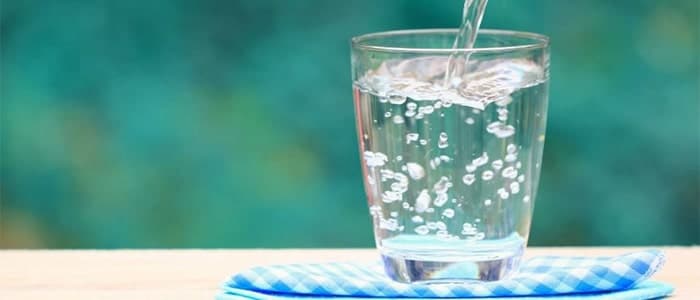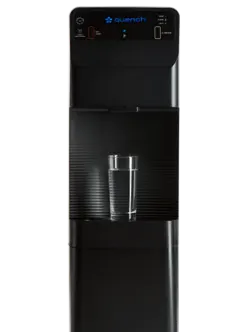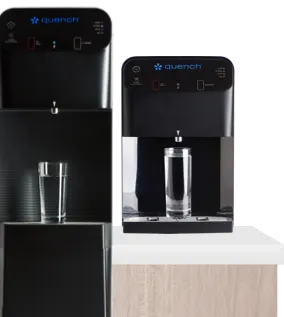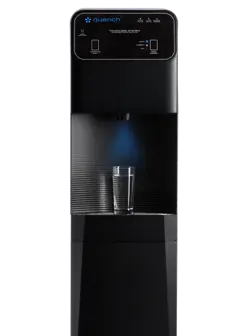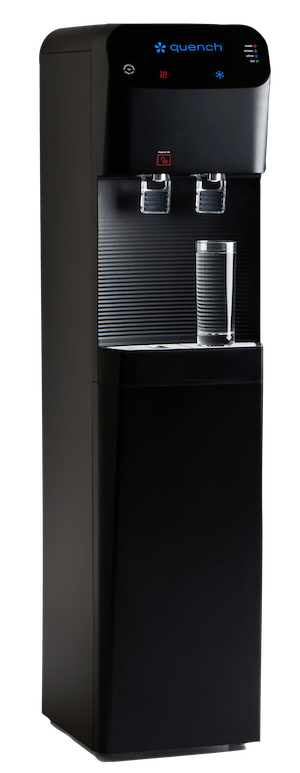The current worldwide health crisis has consumers stocking up on essential supplies like hand sanitizer, spray disinfectant, and cleaners to prevent the spread of coronavirus. Plastic water bottles are also flying off the shelves, leaving many to wonder if coronavirus can also be transferred through tap water.
Well, rest assured, the Quench Water Experts are here to answer your questions and hopefully calm your nerves.
Coronavirus Has Not Been Found in Drinking Water
Studies from the past couple of months concerning coronavirus in water conclude that the virus can temporarily survive in water, but don’t start panic buying single-use bottles just yet. Thus far, research shows you can’t get infected with the coronavirus from water under the conditions you would normally be exposed (i.e. drinking water from the tap, taking showers, swimming in pools, and/or oceans, etc.).[1] The U.S. Environmental Protection Agency (EPA) confirms “the risk [of contracting coronavirus from] water supplies is low. Americans can continue to use and drink water from their tap as usual.” [2]
Plus, EPA regulations concerning the treatment of public water systems are effective in preventing waterborne pathogens, including viruses, from contaminating drinking water. You also have the word of the World Health Organization (WHO) to ease your concerns. WHO says, “conventional, centralized water treatment methods which utilize filtration and disinfection should inactivate [coronavirus].”
Let us dive into the science behind all these claims. First thing to consider when assessing the risk of catching coronavirus from drinking water is the extensive filtration and treatment process carried out by drinking water systems. Today, the most common public water treatment process includes at least three stages of filtration. Filtration removes dirt and harmful microscopic particles as well as bacteria, viruses, and chemicals. After the water has been filtered, a disinfectant like chlorine, chloramine, or ozone is added. Those conventional water treatment methods are enough to provide end-users with safe drinking water and remove or inactivate Sars-CoV-2, the virus that causes coronavirus.
Also, consider the fact that water is a diluent. That means on the rare chance Sars-CoV-2 makes it through the extensive public treatment process, it is still improbable the virus would appear at high enough concentrations to infect you. The diluting qualities of water make it extremely difficult for the virus to surpass the minimum infection dose needed to cause illness.
Coronavirus Beyond Drinking Water
The diluting qualities of water make it highly unlikely for you to contract the virus from water sources like showers and public swimming areas. According to the CDC, there is no evidence that proves the virus can be spread through the water in pools, hot tubs, spas, or water play areas. Those water sources are often treated with chlorine and bromine, which would further neutralize the virus and further reduce your chances of catching the disease. Scientists also believe coronavirus is harmless when traveling through the ocean water. Ocean water’s diluting qualities, the constant movement of the water, and the sea salt, all lower the virus’s chances of survival.
Those who choose to take a deep dive in public swimming areas are more likely to contract the disease above the surface, especially when surrounded by crowds of people. Studies show that Sars-CoV-2 can remain airborne in the form of fine droplets for up to three hours.[4] Therefore, it’s best to continue to follow government guidelines and maintain social distancing until told otherwise. Learn more about your chances of catching the virus outdoors.
Staying Safe While Drinking Water
The fight against coronavirus is not an easy one, and the virus’s ability to linger for long periods of time underscores the importance of hygiene. However, when you implement the proper means of protection, you can significantly lower the chances of infection. When offices and businesses start re-opening, we recommend placing disinfectant wipes and hand sanitizer near all shared surfaces, including your Quench water coolers. Check out this list of disinfectants you can use to fend off the Sars-COV-2 virus.
You Can Keep Your Employees Healthy with Bottle-Free Water Coolers
Quench bottle-free water coolers feature several sanitization features, including LED ultraviolet (UV) light sanitization and antimicrobial surface protection. Our UV-C sanitization technology helps prevent the growth of potentially harmful micro-organisms in water. The UV lamp is located inside the water storage tank to help maintain the cleanliness of the water and surfaces of the tank. Antimicrobial surface protection is silver ion-based technology that is built into the outside surfaces of the water machine.
The combination of UV light sanitization and antimicrobial surface protection ensures that the inside and outside surfaces of your water machine are protected against micro-organisms. Many Quench water coolers come with both of these cleaning features, including the Q7 Series and the Q5 Series.
The Q7 and Q5 bottle-free water dispensers also produce mineral-infused and electrolyte-enhanced alkaline water. quenchWATER+ is filtered on demand through our proprietary 5-filter setup to reduce contaminants and bad tastes while adding minerals, electrolytes, and alkalinity to help keep you hydrated and healthy. Studies suggest that alkaline water enhances your hydration, and hydration is key to having a strong immune system.
For those who wish to avoid direct contact with their water dispensers altogether, don’t worry…we have touchless options. The Q5 features rugged paddles for touchless dispensing. With the Q5, users push their glass or bottle up against the dispensing paddle to unleash a steady stream of clean, great-tasting water. Dispensing paddles can also be found on our Quench 980 Series, which includes four different models of infrared sensor activated filtered water and chewable ice machines.
Those who would prefer to go totally hands-free can check out our brand-new foot pedal for your Q7 water machines. The foot pedal dispenses cold water only and must be installed by a Quench technician. Call or email us to ask about getting a foot pedal for your Q7 today. The wall-mount Hydration Station is another viable hands-free option. This touch-free, ambient water dispenser is installable on virtually any indoor wall space.
If you are returning to work from a months-long hiatus, we’ve made it easy to get your office water cooler back in business. Download Quench machine sanitization instructions for a step-by-step guide on how to easily clean and prepare your machine to provide refreshing, healthy Quench water.
At Quench, the health of your employees, customers, and guests is our top priority. Provide the entire office with clean, safe drinking water to keep spirits high and bodies hydrated. Discover more ways Quench water can boost your employees’ immune systems and support their well-being here.
[2] https://www.epa.gov/coronavirus/coronavirus-and-drinking-water-and-wastewater
[3] https://www.bbc.com/future/article/20200317-covid-19-how-long-does-the-coronavirus-last-on-surfaces
